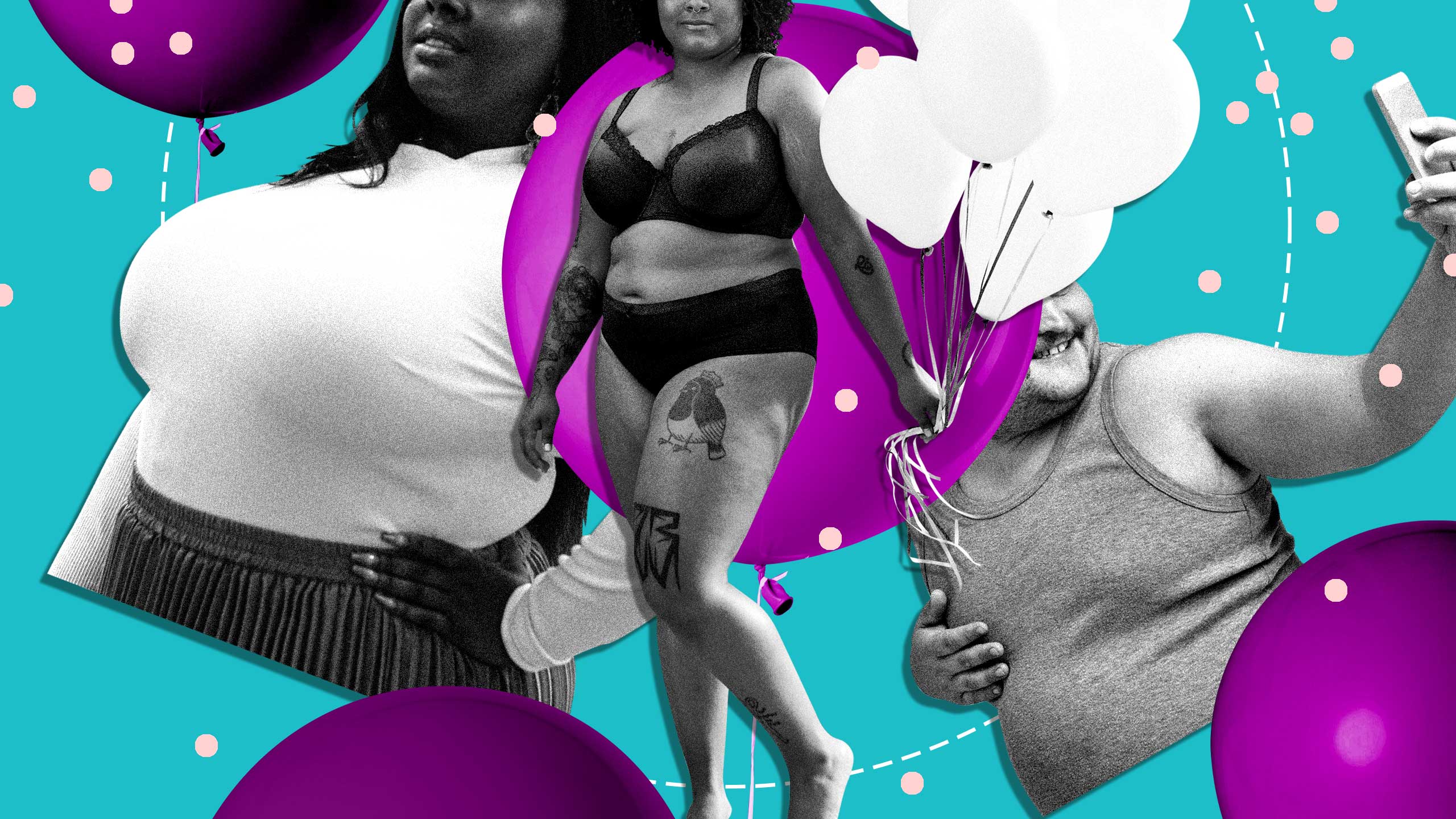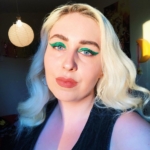Last summer, hundreds of people watched an affirming celebration of fatness on their screens: A stage full of fat go-go dancers, led by a fat DJ, celebrating the intersection of being plus size and queer. The hour-long event in August included fat performers dancing on a small stage in Manchester, filmed and streamed live as a part of the city’s online Pride celebrations. (Full disclosure: I helped introduce the event via video with Manchester Pride.) Even if only for a moment, fat people partying were the focus of Pride—an opportunity to reminisce and find joy in their bodies for the days, weeks and months to follow. This small-scale production, complete with velvet curtains side stage, felt like the start of something new—something we ought to see at Pride celebrations forever.
That hour of LGBTQ2S+ fat pride was all thanks to event planning couple Joe Spencer and Niall O’Conghaile. “I wanted to do something that had an impact,” Spencer says. “My partner Niall and I both feel that big bodies are underrepresented in mainstream gay media. We also wanted to showcase all the fat and fabulous people we know, and to give them a platform to show off.”
Creating a safe space for fat queer performers was integral to the duo—particularly because of their own lived experiences. “As a fat performer, I am used to being in a minority and having different emotional and physical needs because of my body size,” Spencer says. O’Conghaile agrees: “Growing up I always felt very alienated from gay culture,” he says. “There seemed to be very little place for fat people and if you look back over archival gay and queer material, you rarely see fat bodies depicted in a postive way.” Having an official platform at Manchester Pride, Spencer adds, makes the moment even more powerful.
The couple hopes they can not only continue to incorporate Fat Pride into Manchester’s celebrations next year, but also during other U.K. Prides. That, they say, would actively bring festivities back to its roots of celebrating those who are actively othered in our society; creating a space for LGBTQ2S+ fat people is imperative to keeping Pride inclusive.
“Creating a space for LGBTQ2S+ fat people is imperative to keep Pride inclusive.”
That’s why Sade Alexis, a queer content creator based in London, believes that Fat Pride should be a necessity in LGBTQ2S+ spaces. “The image of queer people is usually cis, skinny and white,” they say, “and it’s very important to highlight and celebrate all members of the community—especially those who are further marginalized.”
Because fatphobia is so insipid in our society—affecting everything from our clothing to our careers—Alexis says that the more we see fat representation and fat positivity, the greater the impact on the lives of plus-size people. “The way to counteract fatphobia is by drowning out those negative voices with positive ones,” they say. “We need more events specifically celebrating fat queers, more fat queers being asked to talk about queerness.”
maya finoh, a cultural worker and abolitionist based in Brooklyn, adds that creating and keeping fat pride in queer spaces will further empower fat queer people. “It is critical to have a fat liberation framework in queer and trans spaces. We should be able to come into LGBTQ2S+ spaces with our full, abundant selves,” they say. “There is a rich history of queer fat women who’ve connected the struggle against fatphobia to other liberation movements against homophobia, transphobia, racism, imperialism, and so on.”
finoh specifically cites The Fat Underground, a fat liberation group focused on confrontational activism, whose fat manifesto exemplified a reclamation of body-shaming narratives. In it, the group—an offshoot of the National Association to Aid Fat Americans founded in 1969—demands respect and aligns themselves with fellow minority groups.
Fat liberation, according to Melbourne’s Laura Du Vè, is inextricably linked to queerness. The plus-size model and photographer says being a fat lesbian is a lived experience completely different to that of being a thin lesbian. Removing either side of these identity factors would entirely change who she is and how she perceives the world.
“While some fat-only events and clubs exist, the unique intersection of queer and fat is lacking.”
What Du Vè requires of queer spaces—and not just Pride—is more visibility. “I would love to have fat queer, trans and non-binary folks at the front. I would love to see them in club spaces and have spaces that have an active stance on fatphobia and stand up for fat folks, rather than us having to do all the groundwork,” she says.
While fat-only events and clubs have been spotted occasionally in cities such as Brighton and London, there is a specific queer element missing. The unique intersection of queer and fat is lacking, and as Du Vè notes, there is a need for spaces where these identities can find pride, support and joy.
Support, Du Vè says, is just as crucial as representation—and Anshuman Iddamsetty, a fat activist based in Toronto, agrees. Without support systems in place for fat people, fat representation means little on its own. Just as The Fat Underground centred its movement alongside those of other minorities in the 1970s, so too must modern day fat pride push for radical liberation not solely for white fat bodies, but fat bodies that encompass all kinds of intersecting identities.
“To be fat and brown and queer is sacred; they nourish each other.”
Iddamsetty also notes that the inclusion of Fat Pride in Pride events does not just tick a box of inclusivity, but uses its space to lift up the people that created fat liberation in the first place: Black fat people.
“To be fat and brown and queer is sacred; they nourish each other,” he says. “If fat pride is a way of letting those who have been historically excluded from pride movements to live free of fear and scorn—fat Black trans people, fat Black femmes—then I’m all for it, but it needs to be focused on liberation for all.”
If Pride is to open up its inclusivity to incorporate Fat Pride, then it also needs to not only represent but uplift and support the fat, queer identities that intersect with other minority groups, Iddamsetty says. If we are not using our spaces—or creating new spaces—to help those who need it the most, the inclusivity we are preaching turns into a new form of exclusivity.


 Why you can trust Xtra
Why you can trust Xtra


